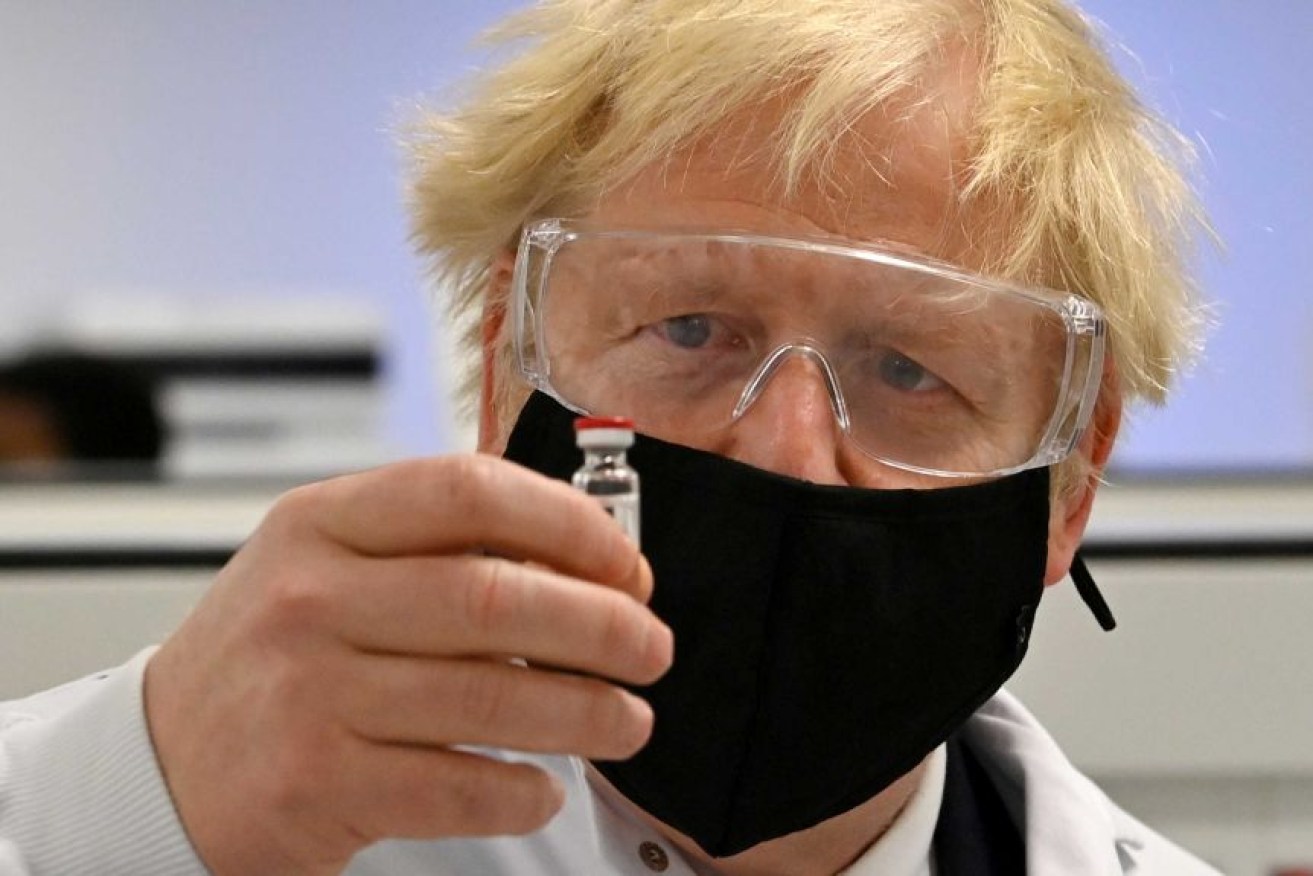How an obscure husband-and-wife company helped ‘save the world’ in 324 days
When BioNTech began work on a SARS-CoV-2 vaccine in mid-January, the project was dubbed Lightspeed. The codename was blessedly prophetic.

British Prime Minister Boris Johnson with the Pfizer-BioNTech vaccine. The Oxford AstraZenica candidate has returned transformational results. (Photo: ABC)
And now, 324 days later, the obscure German company — which had never before brought a pharmaceutical to market — has achieved regulatory approval, propelling its scientific breakthrough into the annals of human endeavour.
The drug’s arrival into hospitals and surgeries across Britain, and soon everywhere else, marks an achievement that will rival the Moon landing in capturing the imagination of billions of people across the world.
Dr Özlem Türeci, one half of the husband-and-wife team behind BioNTech, declared the work of mass production was now underway.
“We have started immediately the process of delivering our vaccine,” she said.
Her husband, Professor Uğur Şahin, has previously described their vaccine as “the beginning of the end of the COVID era”.
On Wednesday, British Prime Minister Boris Johnson issued thanks on behalf of his country, saying the medical advance would “allow us to reclaim our lives”.
The greatness of the scientific triumph is difficult to understate.
In the wake of the worst human health disaster in a century, one-and-a-half million families are grieving, and millions more fear they might be next.
Whole industries are in ashes and legions are out of work. The very organising principles of society were turned on their head.
Now, finally, help has arrived. And British politicians were, of course, quick to sniff the gravy.
Business Secretary Alok Sharma claimed it was “the day the UK led humanity’s charge against the disease”, prompting exasperation from Germany’s ambassador: “Why is it so difficult to recognise this … great international effort?”
While hard-right Tories falsely crowed the approval was evidence of the wisdom of Brexit, the European medicines regulator insisted more time and more careful analysis was needed.
One German politician in Chancellor Angela Merkel’s party described Britain’s announcement as “hasty”.
The UK’s regulator, June Raine, insisted “no corners had been cut”, despite approving the vaccine only 23 days after its final clinical trial data was published.
“The public can be absolutely confident that every rigorous check has been done.”
In any event, it is plainly no time for hubris in Westminster.
The importance of Wednesday’s announcement is rivalled only by the scale of the Government’s mishandling of the pandemic thus far.
While the UK is spending and borrowing more as a proportion of GDP than France, Germany, the United States and Japan on its coronavirus response (the equivalent of $1.2 trillion), a greater number of its countrymen and women have died anyway (per head of population).
It’s also on track to record a deeper recession.
And after a string of operational debacles during the year, from vast shortages of PPE to a practically worthless test-and-trace regime, it is facing grave challenges to ensure the wonder drug is actually delivered.
On Wednesday morning, BioNTech, which developed the vaccine in partnership with Pfizer, announced the first shipments had already been boxed in its factory in Puurs, Belgium, and were on their way to the UK: 800,000 doses over the coming week.
It will barely touch the sides. There’s more than 100,000 people in Britain who currently have the virus, and there’s still more than 15,000 new infections being recorded each day.
Whitehall has ordered enough to immunise 20 million people, but in a country three times that size, more is needed.
Germany, for example, says up to 65 per cent of the population will need to be vaccinated to quell the virus.
“This will be one of the biggest civilian logistical efforts that we’ve faced as a nation,” Health Secretary Matt Hancock conceded.
“There will be challenges and complications.”
Already, the UK Government’s published priority list for immunisation delivery is facing adjustment.
While residents of aged care homes, and the staff who care for them, are meant to go first, the need to ship the vaccine at -70C means others will have to cut in front.
The vaccine can survive in a fridge for five days and in a specially designed cooler bag for six hours.
BioNTech had envisaged it would be delivered to aged care homes by motorcycle courier, but Downing Street has not yet addressed these crucial details as it awaits more direction from the regulator.
Professor Wei Shen Lim, head of the Government’s vaccines joint committee, acknowledged on Wednesday that “there may be operational reasons why the prioritisation needs to be more flexible”.
Hancock — who has offered to get his jab live on television — claims 50 hospitals in the UK have been set up to receive and deliver the vaccine, and that further immunisation centres are now being established.
But on the basis of the Government’s performance thus far in 2020, critics will be keenly watching.
Pfizer’s chief executive Albert Bourla, who described the approval as an “historic moment”, said he had faith in Britain’s National Health Service to do the job.
A mass inoculation scheme is being prepared on the other side of the channel, too.
In recent days, Brussels Airport has been testing its ability to process the cold-stored freight, and in Dusseldorf work is underway to turn a 54,000-seat stadium into a vaccine delivery centre.
The World Health Organization has already warned poorer countries must not be left behind, citing a several-billion-dollar funding shortfall in access to tests and vaccines.
The scientific world has done its bit, it seems, and now it will be up to governments to ensure the vital shots are actually delivered into people’s arms.
The task is complicated, but there are perhaps even more perilous challenges still further ahead.
Not least of which is the inevitable financial reckoning.
The World Bank has forecast the deepest global recession since WWII, and declines in production not seen since 1870.
Governments have borrowed many trillions of dollars of debt which must, eventually, be repaid.
Europe is still feeling the impact of its last financial crisis.
Joblessness soared for a decade and remains high, and thanks to crushing austerity drives, extremist politics has found a new voice on the continent.
However much a relief the news brings, it’s clearly too early for celebration.












